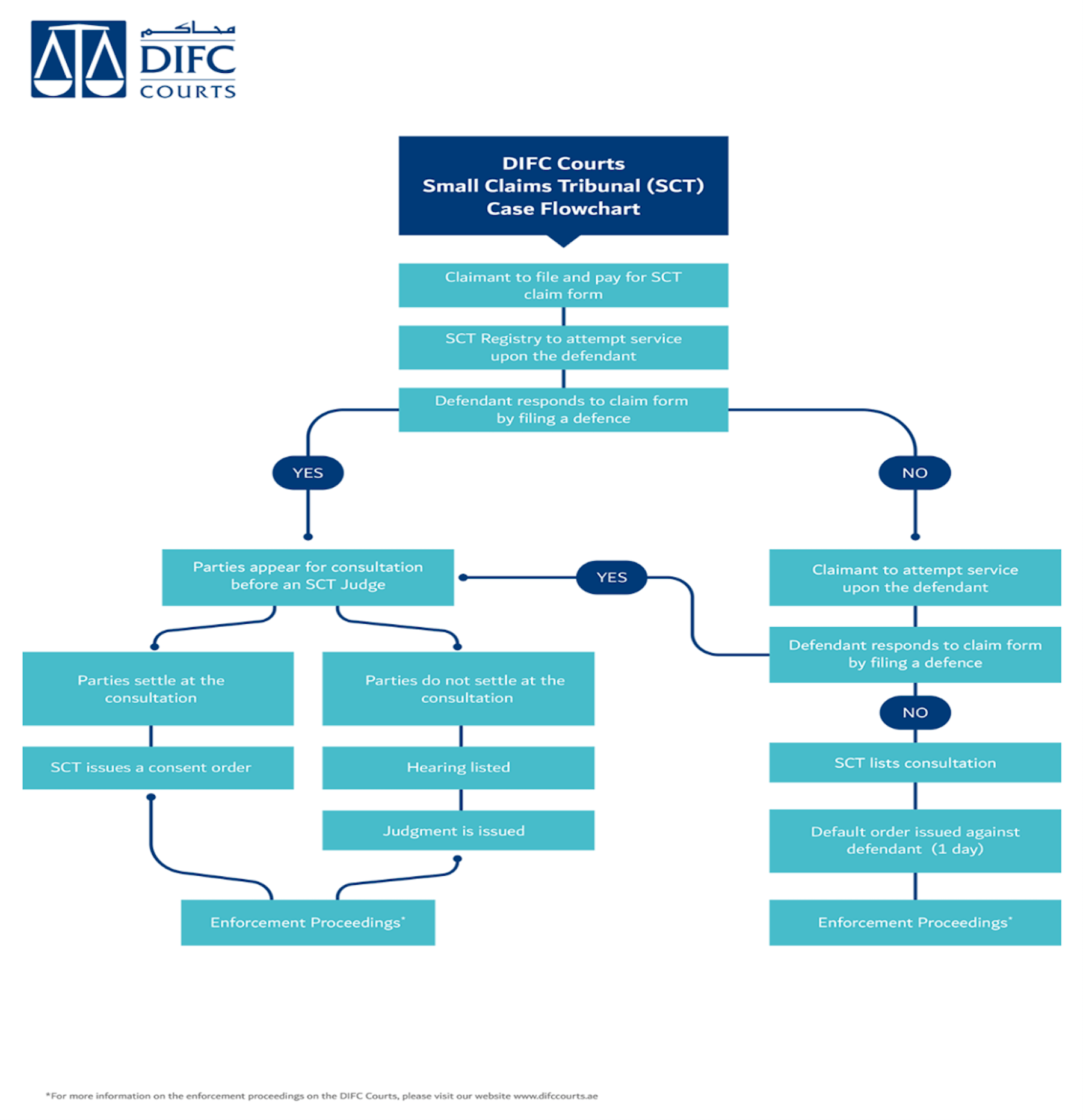Dubai, UAE
Key Takeaways:
- The Dubai International Financial Centre (DIFC) Courts provide a unique system to settle disputes efficiently and quickly through their Small Claims Tribunal (SCT), encouraging individuals and businesses to represent themselves without a lawyer.
- SCT handles claims under a specific threshold (AED 500,000, or AED 1 million with mutual agreement), and all employment claims, regardless of value, if all parties to the claim agree in writing to use the SCT. Typically, cases involve disputes related to small business transactions, employment, and tenancy.
- Initiating a small claim starts by submitting a claim form to the SCT Registrar through the DIFC Courts e-Registry or in person at the Registry.
- Court fees are calculated based on the type and value of the claim. For employment claims, the fee is 2% of the claim value, while for all other claims, it is 5%. Both have a minimum fee of USD 100.
- Before moving forward with the case, an SCT judge holds a consultation meeting with the parties to attempt to settle the dispute. If successful, the SCT will issue a Consent Order reflecting the agreement, which is treated as a final and binding judgment, otherwise, the SCT will schedule a formal hearing.
- SCT proceedings are typically private and informal, often conducted remotely using video conferencing.
- SCT judgments are final and binding, enabling enforcement both within and outside the DIFC. There is however a limited right of appeal from the SCT to the Court of First Instance, which must be based on points of law, not on facts or evidence.

1. Eligibility for SCT
To determine if the dispute qualifies for SCT, it must meet one of the following criteria:
- the claim (the monetary value) does not exceed AED 500,000;
- it is below AED 1 million for non-employment-related claims, with mutual consent from all parties; or
- it involves employment-related disputes without a value limit, provided all parties agree to SCT jurisdiction.
2. Pre-action Considerations
Before starting court proceedings, it is advisable to consider carefully the potential legal and commercial implications. It is crucial to keep in mind the ultimate desired outcome and if going through with the case is worth it. For example, sometimes winning a case may not be in the business’s best interest if it leads to reputational damage, waste of resources, or cutting business ties with the other party.
This is when it may be important to consult a lawyer who can review and assess the case and provide their opinion on the potential case outcome. The lawyer’s key role at this stage is to advise the claimant (the person filing the claim) on whether they have a valid case, and the defendant (the person being sued) on whether to settle or fight in court.
In DIFC courts, parties often exchange written communications regarding the dispute before starting court proceedings. While this is not mandatory, it is advisable to exchange pre-action letters to stay in good standing when the court decides on how to allocate claim costs. The court takes into consideration the parties’ actions taken before and during the court proceedings, and accordingly, any reasonable effort by a party to settle is viewed favourably by the court.
3. Initiating a Claim
To initiate a small claim, begin by submitting a Claim Form (Form P53/01) to the SCT Registrar through the DIFC Courts e-Registry system or in person at the SCT Registry.
This form requires comprehensive information about the case, including personal details (name, address, email address and telephone number), and similar details for the defendant. It is crucial to clearly outline a concise summary of the remedy sought and the grounds for entitlement to this remedy, including a statement of the monetary value of the claim. For employment-related claims, attach copies of relevant employment documents, such as a contract or offer letter.
After submitting the claim form, a confirmation along with an invoice will be received. This invoice must be paid to be formally accepted and processed further. If the submission is unsuccessful or requires rectification, a notification of the error along with guidance on how to correct it will be received.
4. Court Fees
Court fees are calculated based on the type and value of the claim. The fees are precisely listed and available on the DIFC courts’ website.
As of the date of publishing this article, for employment claims, the fee is 2% of the claim value with a minimum fee of USD 100. For all other claims, the fee is 5% of the claim value, also with a minimum of USD 100.
5. Serving the Claim
Once the claim is filed, the SCT will serve it to the defendant, unless otherwise directed. The defendant is then given 7 days to acknowledge the service. If the defendant does not respond within the time limit, the SCT may issue a default favourable judgment.
6. Responding to a Claim
If you are the defendant, upon service, you must acknowledge it within the timeframe and specify whether you admit the claim, intend to file a defence to the claim or challenge the SCT’s jurisdiction over the matter. You can also file a counterclaim against the claimant, if applicable.
7. Consultation
If a defence or a counterclaim is filed and/or after the time for filing such a statement has passed, the SCT Registry schedules a time for the parties to attend a consultation within two weeks after the service of the claim form.
This consultation is a confidential and informal meeting between the parties and the SCT Judge, who will try to help them resolve the dispute. Discussions during the consultation are without prejudice, i.e., cannot be used in subsequent hearings if the matter remains unsettled.
Attendance at the consultation is mandatory for each party. The SCT encourages the parties to represent themselves without lawyers. For a lawyer to represent a party, they are required to obtain the SCT judge’s prior approval. If one party obtains permission for legal representation, the other party will be given the chance to seek their legal counsel. For corporate parties, representation can be through any of their full-time officers or employees.
Each party must submit, alongside their claim form or defence, any documents they intend to rely on during the consultation. The consultation is generally held privately unless the SCT Judge decides otherwise. Discussions during the consultation are confidential and cannot be used in subsequent hearings if the matter remains unsettled.
If a settlement is reached, the SCT will record it and issue a consent order. If, however, the consultation does not result in a settlement, the SCT judge can either schedule another consultation or arrange for a hearing of the claim.
8. Hearing
The hearing process is structured with specific guidelines (53.49 – 53.59 of the Rules. Usually, the SCT judge who oversaw the consultation will not conduct the hearing. Hearings in the SCT are characterized by their informal nature, providing a more relaxed setting than traditional court hearings.
Parties are typically expected and encouraged to represent themselves. However, a party may elect to be represented by a lawyer, in which case they will need to request the judge’s prior permission. If a party opts for legal representation, they are required to notify the SCT and the opposing party at least four days before the hearing.
9. Non-attendance and Default
Not attending the consultation or hearing without a valid excuse can lead to a judgment or the dismissal of the claim. The SCT may also impose a penalty for non-attendance, such as an adverse costs order or a fine. Therefore, it is important to notify the SCT in advance if you are unable to attend and request an adjournment.
10. Judgment
The SCT judge must provide reasons for their judgments in a straightforward and concise manner. The judge may give these reasons orally at the hearing itself, or, in writing, in situations where the judge decides a case without a formal hearing.
11. Costs
Parties typically cover their own costs; however, the SCT may impose costs on a party that has acted unreasonably throughout the proceedings. For example, the SCT may find that rejecting an offer of settlement is an unreasonable behavior if the party’s conduct meets the criteria for unreasonableness.
12. Enforcement of Orders
DIFC court judgments hold credibility and are enforceable both locally and internationally. Within the UAE, DIFC judgments are enforced in the same way as the judgments of the Dubai courts. Internationally, DIFC courts have made arrangements with various foreign courts, such as the English Commercial Court, to facilitate mutual recognition and enforcement of judgments. DIFC judgments are also enforceable through the relevant treaties between the UAE and the target country, such as the GCC Convention and Riyadh Convention.
13. Appeals
To start an appeal, an appellant (the party submitting the appeal) must request permission to appeal by submitting an appeal notice using Form P53/02 to the Court of First Instance. A judge then reviews the application to decide whether to allow the appeal.
Permission for an appeal is granted only if the court finds that the lower court’s decision was (1) legally incorrect; (2) unjust because of a serious procedural error or other irregularity in the proceedings (e.g., not allowing a party to present important evidence); and/or (3) wrong in relation to any other matter provided for or under any applicable law. Additionally, for permission for an appeal to be granted, the court must believe that the appeal has a real chance of success, or there is a compelling reason for the appeal to be heard.
For a broader overview and understanding of litigation in DIFC courts, please check our previous article (https://matoukbassiouny.com/news-alert-navigating-difc-litigation-a-guide-for-non-lawyers/).
For any questions or inquiries, please feel free to contact:
